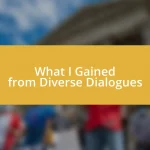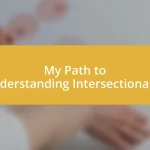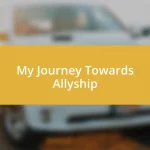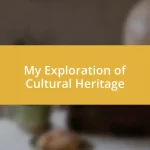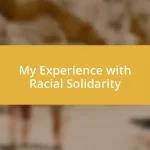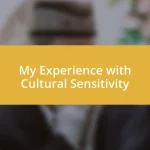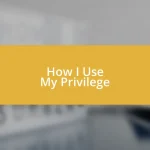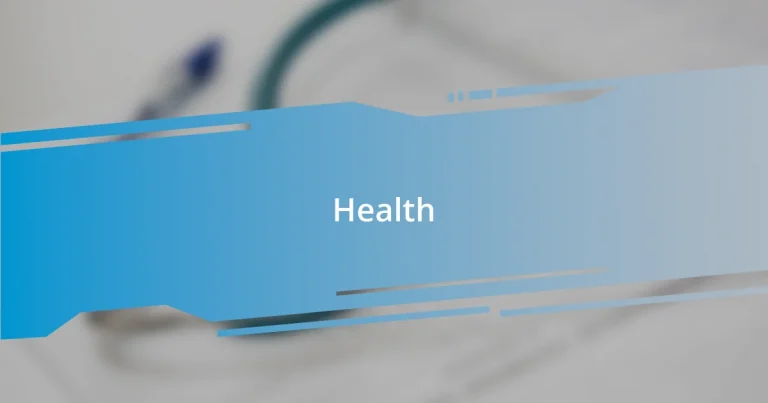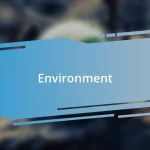Key takeaways:
- Online communities provide a sense of belonging and support, allowing individuals to connect over shared interests and experiences, often overcoming geographical boundaries.
- Identifying personal interests and needs is crucial for finding suitable online communities, guiding engagement and fostering authentic connections.
- Active participation, sharing knowledge, and building long-lasting relationships through small gestures and consistency strengthen the sense of community and collaboration.
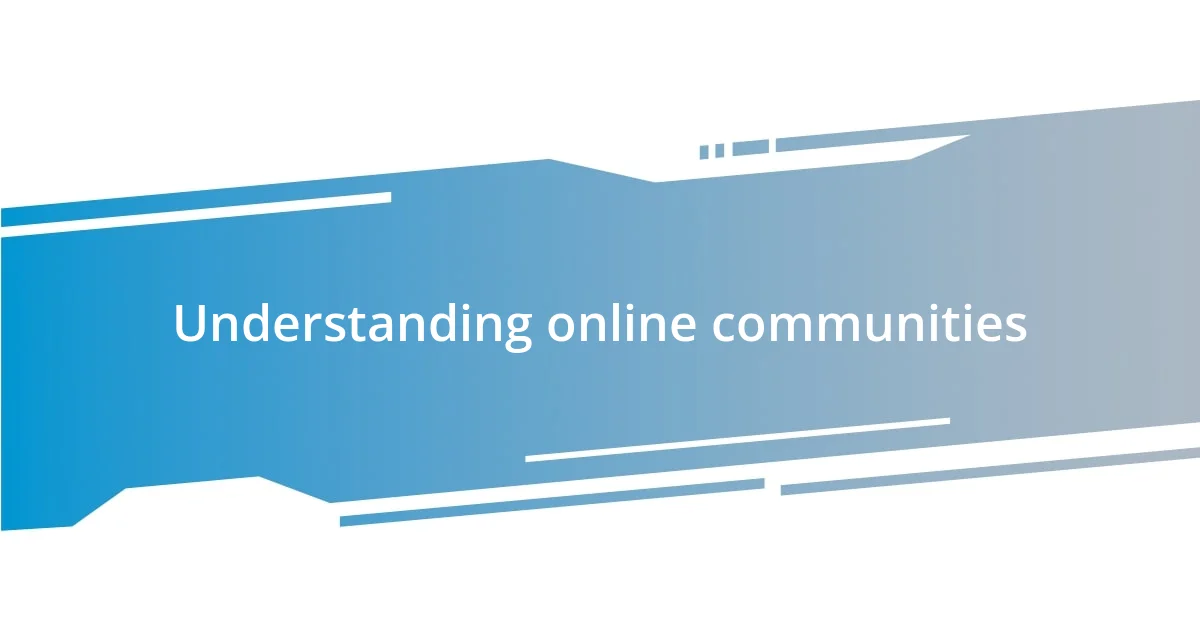
Understanding online communities
Online communities are fascinating ecosystems where individuals can connect over shared interests and experiences. I remember my first encounter with an online forum dedicated to my favorite hobby; it felt like stepping into a space where everyone spoke the same language. Have you ever found solace in people who understand your passions without judgment? That sense of belonging is truly powerful.
What strikes me about these communities is their ability to foster genuine connections, often transcending geographical boundaries. For instance, I once participated in a virtual book club, where members from different continents came together to discuss our favorite reads. The diverse perspectives enriched our conversations in ways I never anticipated. It makes you wonder, doesn’t it? How can people who’ve never met face-to-face form such deep bonds?
Emotionally, online communities can provide a lifeline during tough times. I’ve seen individuals open up about personal struggles and find support from others who’ve faced similar challenges. It’s a reminder that, while we may feel isolated in our daily lives, there’s a world of empathy just a click away. Have you experienced the warmth of online strangers rallying to lift you up? It’s moments like that which reaffirm the unique strength of these virtual spaces.
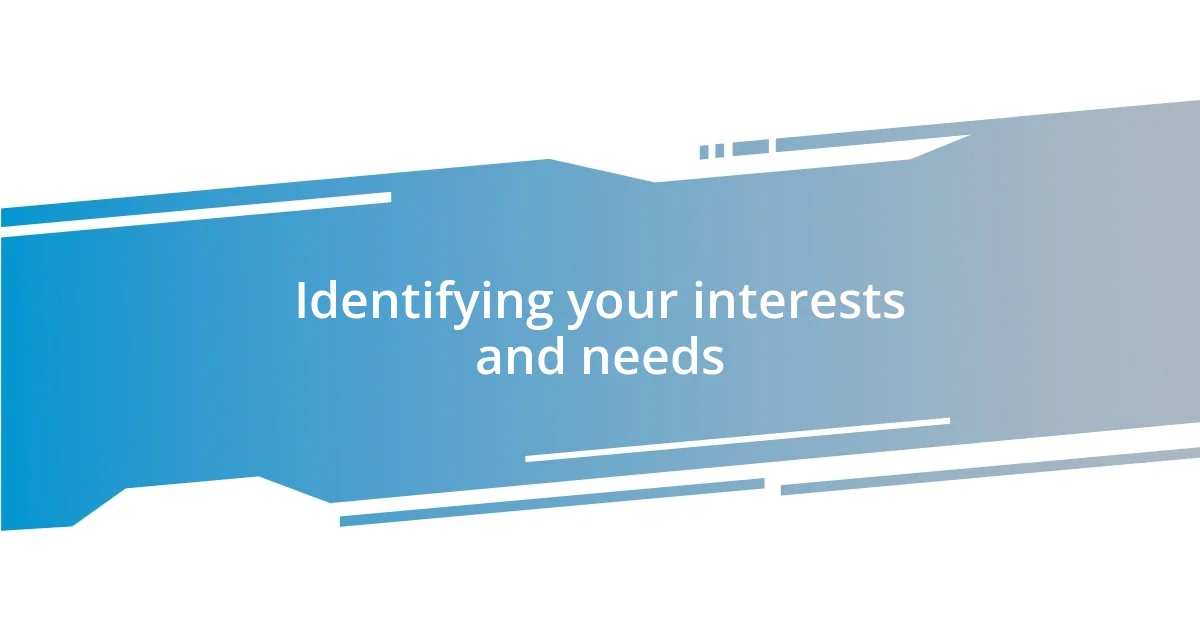
Identifying your interests and needs
Understanding your interests and needs is the crucial first step in finding an online community that truly resonates with you. When I began my journey, I took the time to reflect on my passions—hobbies, topics I love discussing, or even skills I want to develop. Through this self-reflection, I realized that my interests in photography and nature were a perfect blend for connecting with like-minded individuals.
To help identify your interests and needs, consider these questions:
- What topics make you excited or curious?
- Are there hobbies you’ve always wanted to explore but haven’t yet?
- Can you think of experiences where you felt most engaged or fulfilled?
- What kind of support are you looking for in a community?
- Are you seeking inspiration, advice, or simply social interaction?
Asking yourself these questions can illuminate paths you might not have considered before. For me, noting these personal reflections on paper helped clarify my direction. I discovered communities focused not just on photography skills but also on environmental conservation. This dual interest sparked a sense of purpose as I connected with others who shared my commitment to the planet. The more specific I became about my interests, the easier it was to find people who felt like an extension of my own journey.
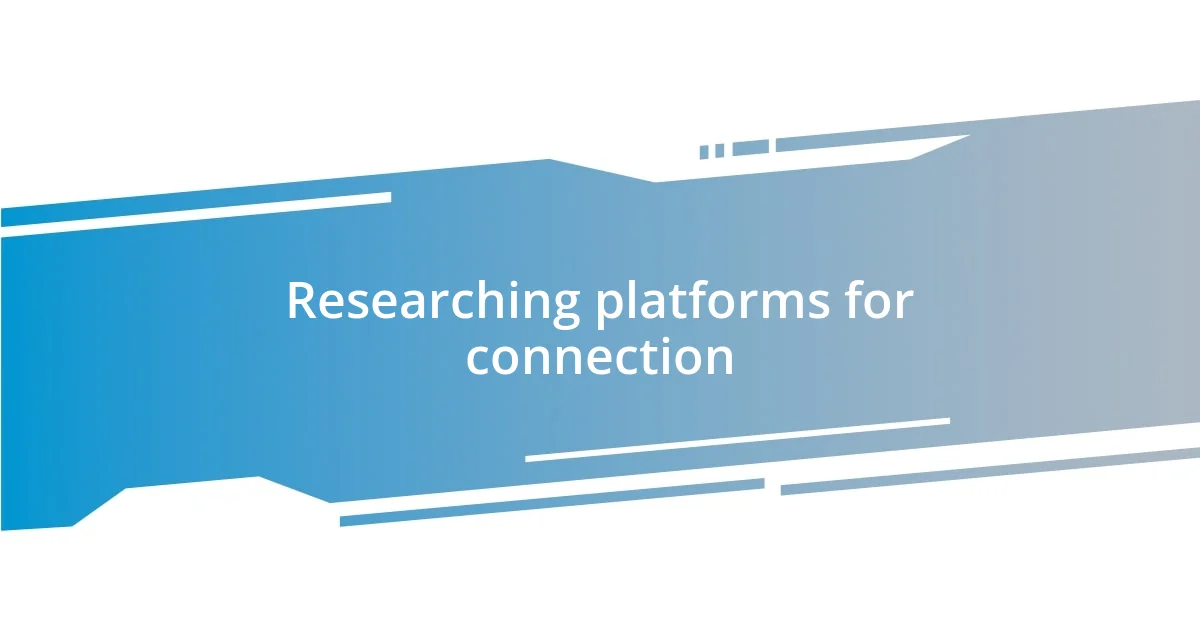
Researching platforms for connection
Researching various platforms for connection has been a game-changer in my online community journey. When I began, I was overwhelmed by the sheer number of options available, from social media sites to specialized forums. I remember spending hours exploring different platforms, each with unique features. It became apparent that certain spaces felt more welcoming for my interests, while others felt transactional. Have you found yourself drawn to specific platforms because they just ‘clicked’ for you?
As I dug deeper, I discovered that each community platform has its own culture and vibe. For example, I found Reddit to be a treasure trove for niche topics, where people genuinely engage in discussions. In contrast, Instagram thrives on visual content and quick interactions. Each platform has its strengths, and understanding these nuances helped me to align my research with my specific needs. Delving into the characteristics of different platforms gave me insights on where I would feel most at home.
I’ve also learned the importance of reading member feedback and testimonials on these platforms. Personal experiences shared by existing members often guide potential newcomers. They provided me with a clearer perspective on whether the community might be nurturing or just a place for casual chat. Ultimately, the research process can be the ticket to finding a space where you truly belong.
| Platform | Description |
|---|---|
| Niche communities where users can engage deeply on specific topics. | |
| Facebook Groups | Community-driven spaces for discussions and events. |
| Discord | Real-time chat, often catering to gaming and shared interests. |
| Visual storytelling with quick interactions and inspiration. | |
| Forums (e.g., Stack Exchange) | Structured Q&A platforms and in-depth discussions on various subjects. |
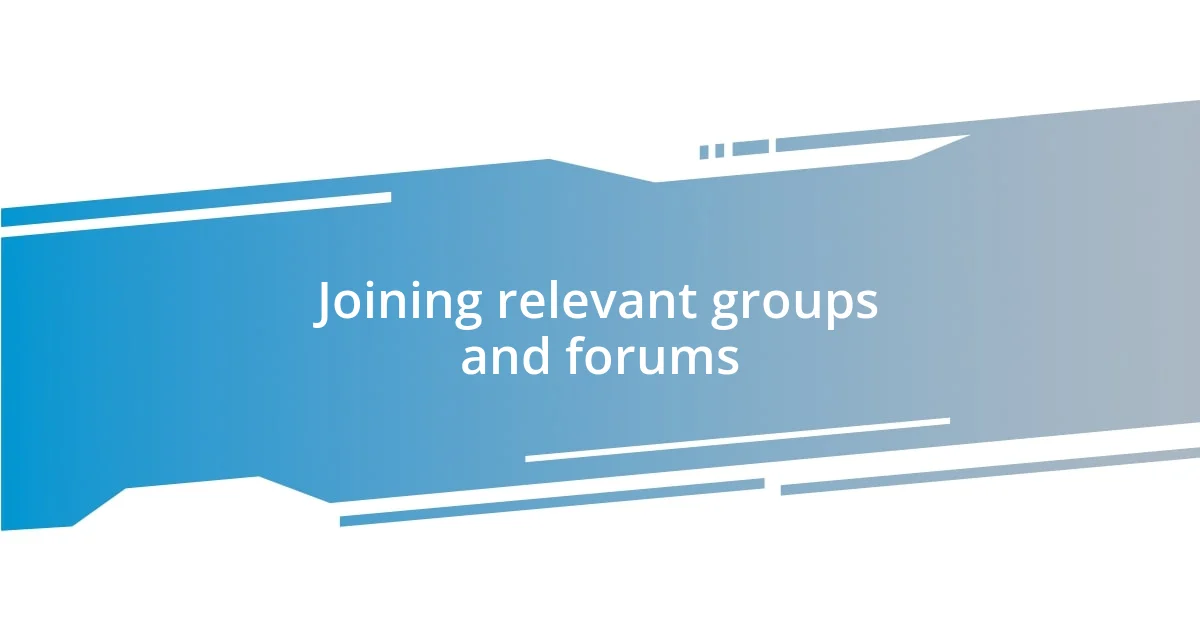
Joining relevant groups and forums
Once I started diving into relevant groups and forums, I realized how pivotal these gatherings are in forming a supportive online community. For instance, I stumbled upon a Facebook group dedicated to amateur photographers. The first time I shared one of my photos, I felt butterflies in my stomach. But the warm responses I received were incredibly validating—I found not just feedback, but encouragement to keep pushing my creative boundaries. Have you ever felt that rush from sharing your work? It can be exhilarating!
It’s fascinating how certain forums can shift from being just digital spaces to nurturing little homes. I recall joining a Reddit community focused on nature photography. The members weren’t just contributors; they were mentors, offering tips and sharing their stories. This engagement made me realize that real conversations and connections happen when we open ourselves up to others. Think about it—when has a simple comment from someone online made you feel like you were part of something bigger?
Being part of these groups has not only enriched my skills but brought a sense of camaraderie that I didn’t expect. I clearly remember a conversation where someone shared their struggle with capturing wildlife in motion. The support and advice that poured in from other members created a collective problem-solving atmosphere. It struck me how we often aim to learn in isolation, but collaboration can supercharge that journey. Isn’t it amazing how a shared interest can forge connections that feel so genuine and fulfilling?
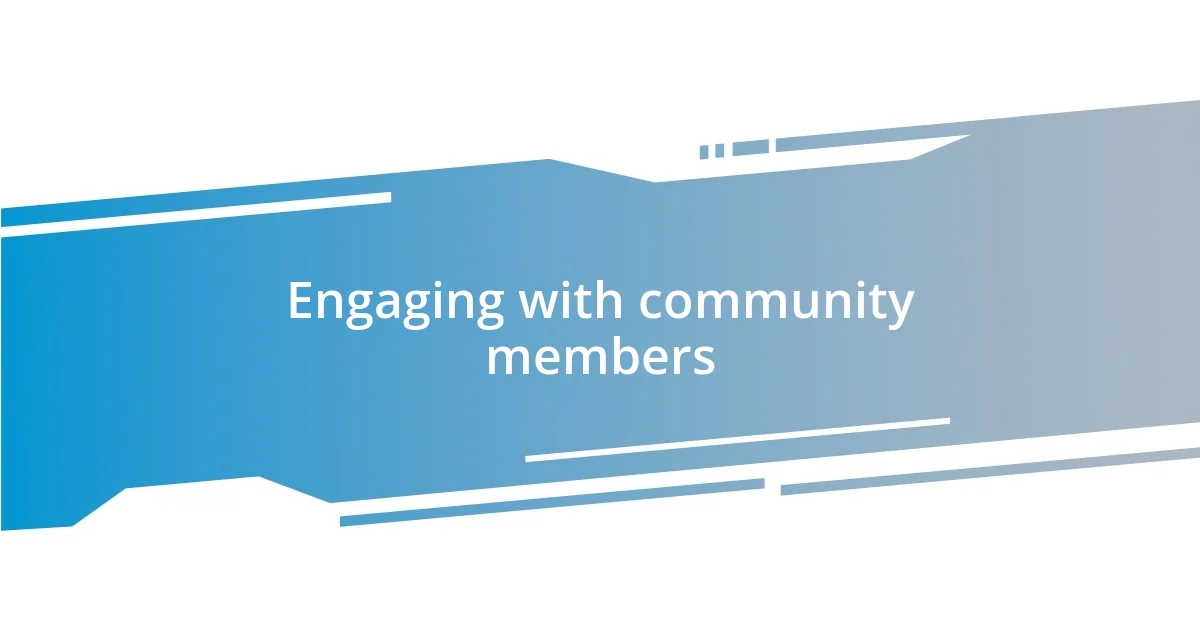
Engaging with community members
Engaging with community members has been one of the most rewarding aspects of my online journey. When I first joined a cooking forum, I remember feeling a bit like a spectator, unsure of how to jump into the conversation. But as soon as I shared my favorite lasagna recipe, the responses trickled in—questions, tweaks, and even some culinary fails that made me giggle. It transformed what felt like an isolated experience into an interactive cooking class where everyone had something to contribute. Have you ever shared a recipe and received unexpected appreciation or advice? It’s a wonderful feeling that creates instant connections.
As I continued to engage, I noticed that responding to others was just as important as sharing my own experiences. On a photography Discord channel, I engaged in a lively debate about the best lenses for night shots. I remember a fellow member sharing their struggle with low-light conditions. I chimed in with a tip based on my experience, and soon we were bouncing ideas off each other. It was fascinating to see how collaboration unfolded organically, fueling our passion further. Isn’t it incredible how helping someone else can elevate your own understanding of a subject?
I’ve also learned that vulnerability fosters deeper connections within communities. Last year, when I went through a tough time with my art, I posted about it in a digital artists’ group. To my surprise, members didn’t just offer sympathy—they shared their own stories of struggle and perseverance. This openness transformed our interactions from casual exchanges to a nurturing support system. It made me realize that when we allow ourselves to be vulnerable, we pave the way for genuine relationships. Can you recall a moment when being open about your challenges led to unexpected support? It really shows the power of engaging authentically.
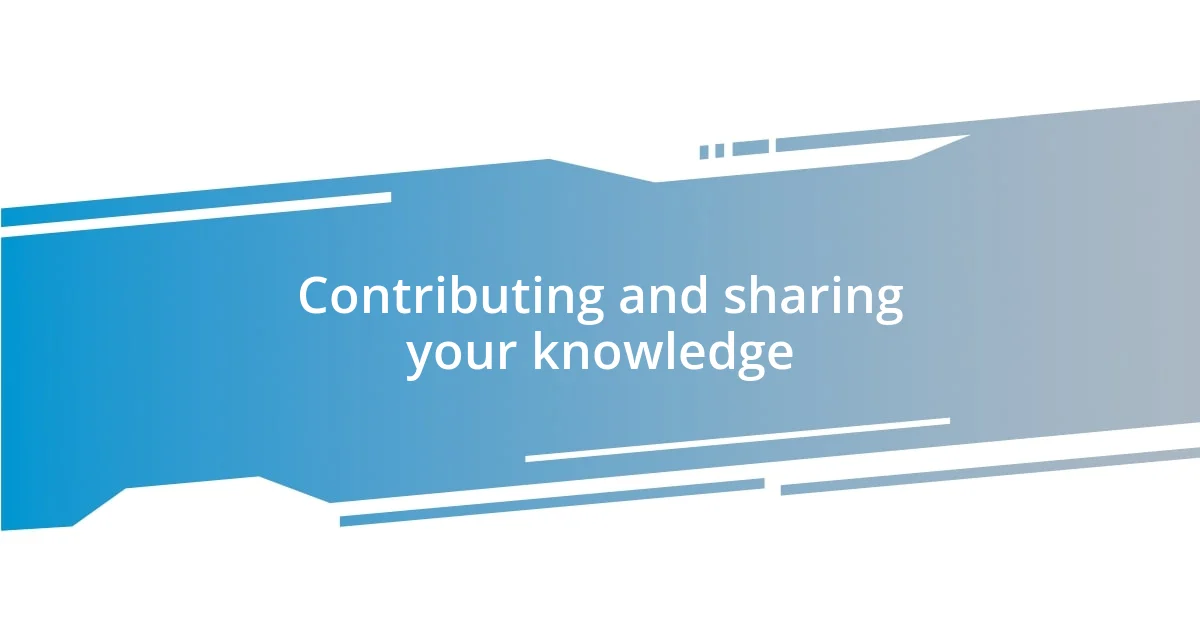
Contributing and sharing your knowledge
Once I became more comfortable in my online community, I started sharing tutorials on my favorite photography techniques. The first tutorial I posted was about mastering natural light—a skill I had painstakingly honed over weeks. To my surprise, many members not only appreciated my effort but also applied the techniques and shared their results. Have you ever experienced that magic moment when your knowledge empowers someone else? It’s like watching a chain reaction of creativity and confidence unfold!
I also discovered that asking questions can be just as valuable as providing answers. When I faced challenges with editing software, I posted a query in a dedicated photography group. The flood of responses included tips, resources, and even links to video walkthroughs. The sense of community felt palpable; I wasn’t just a voice in the wilderness—I was part of a collaborative effort to learn and grow together. Isn’t it fascinating how reaching out for help can strengthen connections and deepen our understanding?
Additionally, I often find joy in sharing lessons learned from my own mistakes. One time, I shared the saga of a photoshoot disaster where I forgot to check my camera settings, leading to completely washed-out images. The laughter I received was genuine, and it sparked a thread of similar blunders from other photographers. Through these shared experiences, we created a space where imperfection was embraced and discussed. Have you ever let out a sigh of relief when someone else admitted to a similar mishap? It’s affirming to know we’re not alone on this journey!
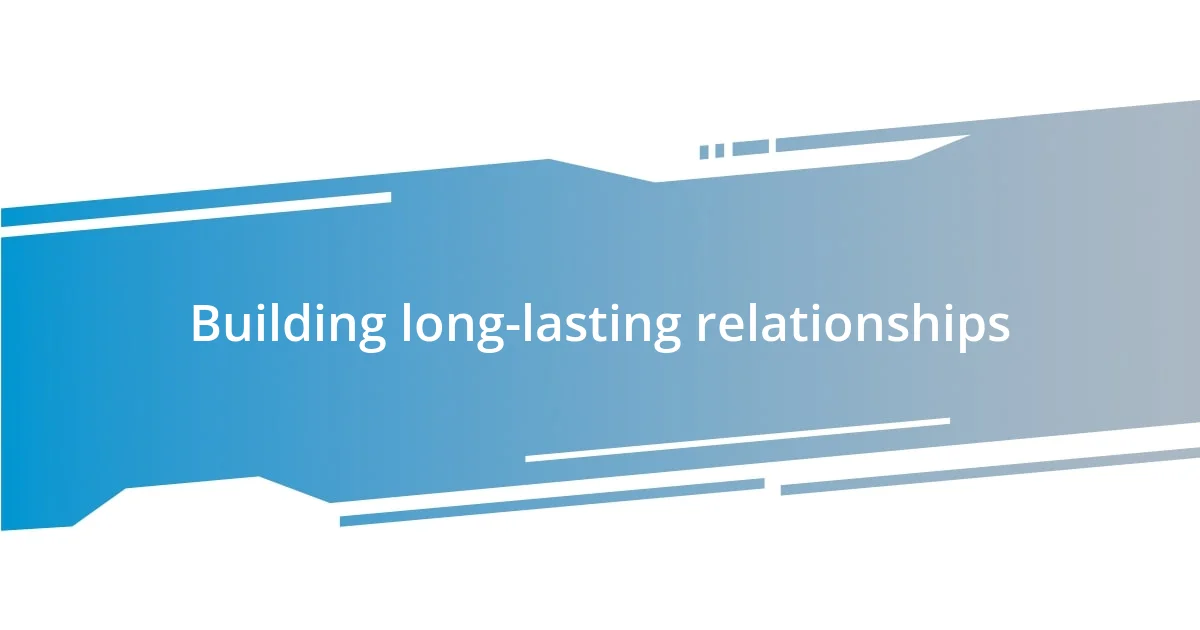
Building long-lasting relationships
Building long-lasting relationships online often hinges on the little things. I remember the first time I remembered a fellow community member’s birthday, simply because they had shared their enthusiasm for the day. When I sent them a message wishing them well, it felt like crossing the threshold from acquaintance to friend. Have you ever taken a moment to reach out and check in on someone? Those small gestures can create bonds that stand the test of time.
Investing time in understanding what makes the people in your community tick can also lay the groundwork for strong relationships. I recall diving into conversations about everyone’s favorite books in a literature forum. As I learned about fellow members’ passions and backgrounds, a shared appreciation blossomed. The joy in discovering that someone else loved the same obscure novel was electric! It made me think, how often do we miss opportunities to connect because we don’t take the time to ask or listen?
Finally, I’ve found that consistency is key. Regularly participating in discussions, whether it’s sharing thoughts on an article or commenting on others’ posts, creates a rhythm that turns fleeting interactions into meaningful exchanges. I remember joining a weekly virtual coffee chat with a group of creative souls, and as the sessions continued, not only did we discuss our work, but we also shared our dreams and fears. Have you ever experienced a relationship evolve simply from showing up? It’s a beautiful testament to the power of presence in building lasting connections.
